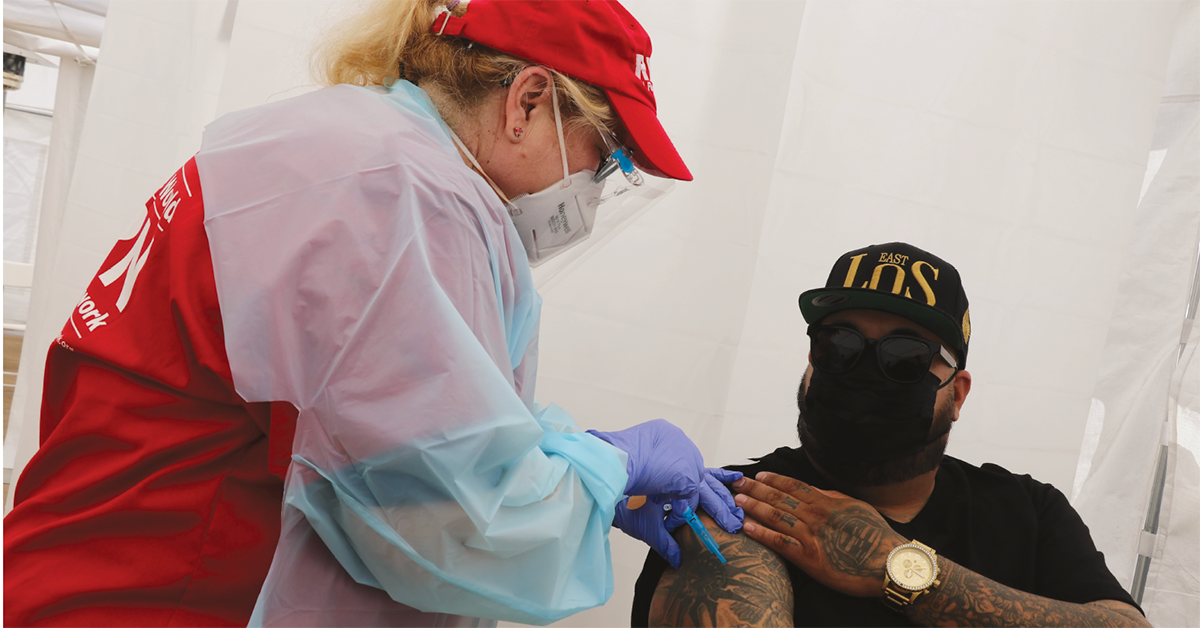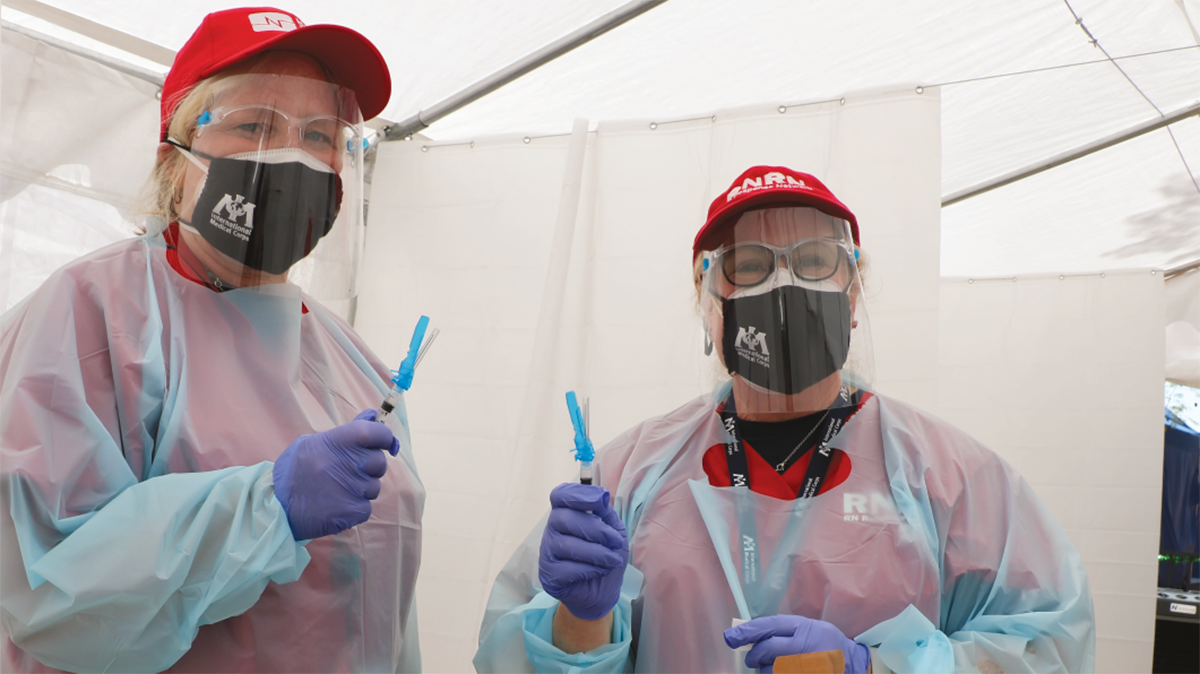Dose of Hope

RNRN volunteers help administer vaccines to thousands in underserved Los Angeles community.
By Chuleenan Svetvilas
National Nurse Magazine - April | May | June 2021 Issue
When the registered Nurse Response Network (RNRN) call went out in February for RN volunteers to vaccinate the underserved South Los Angeles community, nurses immediately answered the call. The RNs were eager to help the predominantly Latinx and Black community who had been hit hard by Covid. The need was urgent: In February, the Los Angeles Times reported that only 5 percent of the community’s residents had been vaccinated. In contrast, the Times noted, 25 percent of residents in wealthier areas on the westside of Los Angeles County had already received their first shot. RNRN, a disaster-relief project of the California Nurses Foundation and National Nurses United, began sending a team of RN volunteers every week from March 1 until the end of May to assist with the administration of Covid-19 vaccines in South L.A. The vaccine clinic was a project of International Medical Corps (IMC), which partnered with RNRN. The two organizations, along with Kedren staff and community volunteers, have helped administer more than 100,000 doses at Kedren Community Health Center. International Medical Corps, a global humanitarian organization that offers medical services and training to people affected by conflict, disaster, and disease, had previously partnered with RNRN in 2019, when Hurricane Dorian hit the Bahamas, and in 2018, providing Hurricane Michael relief in Florida and treating people in the aftermath of Hurricane Maria in Puerto Rico.
“The fall surge in Los Angeles was terrible and so was the surge in our Central Valley,” recalled Sandy Reding, an RN at Bakersfield Memorial Hospital and a president of California Nurses Association/ National Nurses Organizing Committee. “We saw the horror of people dying in record numbers. We shut down our operating rooms at the [Bakersfield] hospitals represented by CNA. We had multiple Covid units. So when the vaccine came out, I wanted to help regardless of where they were.”
Reding arranged to take a week off from work as an operating room nurse to drive more than 110 miles south on Sunday, March 14, to begin her stint at the clinic the following day. Her accommodations in Los Angeles were covered by IMC.
For the RNRN volunteers, the days began at 8 a.m. with drawing doses of Pfizer, Moderna, or Janssen vaccines for the first hour or so. Each vaccine had its own syringe type and needle gauge. Kedren staff tracked the vaccines throughout the day, making sure there was enough left for people who were receiving their second dose and that no dose was wasted.
Tents were set up at the beginning of the initiative in March, including one tent to receive people 65 and older. People lined up for hours. All three vaccines were being offered. “This was medicine, pure and simple,” noted Reding. “Everybody gets a shot. You know you are having a direct impact and that this is going to help them, their family, and their community.”

Maureen “Mo” Berry, an RN who recently retired after 34 years as an emergency department nurse at UC Irvine, also volunteered in March during the same week as Reding. Berry says it was the perfect opportunity for her to give back to the community. “It was a fantastic experience,” said Berry. “It was nice to bring hope by providing Covid vaccines to an area that has been devastated by the virus.”
Berry and Reding both saw a wide range of ages and people of color being vaccinated, including younger generations bringing elderly parents, aunts, and uncles. “I saw the younger generation assisting with translating,” said Berry. “It was such a different experience from working in the emergency room. People were dancing in the waiting area after they got their shot. I could see the smiles in their eyes.”
Brenda Rojas, an RN in the telemetry stroke unit at Kaiser Permanente Los Angeles Medical Center, wanted to volunteer because she saw so many people suffering from Covid, particularly Black and Latinx patients. She took personal time off to volunteer the week after Berry and Reding. “I love public health and it was a great opportunity to help people who were so affected by Covid,” said Rojas, who is a certified Spanish interpreter in her hospital and used her skills to interpret for clinic staff. “People had many questions about the different vaccines and whether there were any restrictions if they were undergoing cancer treatment, already had Covid, or were pregnant or breastfeeding.”
Working in the vaccine clinic was especially meaningful to Roseann Devlin, an RN in the oncology unit at Providence Little Company of Mary, and Manuel Belderol, RN, who works in the rehab unit at Keck Hospital of USC. They each got Covid last year and volunteered in early March.
Devlin got Covid in December, in between her vaccination doses. She struggled through shortness of breath, decreased oxygen saturation, terrible bouts of coughing, and a too-fast heart rate. Due to her existing health conditions, she was unable to take any of the new drugs to ease her symptoms, but she was able to go back to work after nearly three weeks off.
Last year during the pandemic, Belderol’s rehab unit had been closed a few times so he was reassigned to different units, including Covid units. He contracted Covid in March 2020, lost his sense of taste and sense of smell for two weeks, and suffered from excruciating back pain before he began feeling better. He spent two months recovering at home before he was able to go back to work. Unfortunately, he also gave Covid to his family, including his wife, an RN at Good Samaritan Hospital in Los Angeles, and his son. His daughter tested positive but was asymptomatic. Luckily, no one in the family needed to be hospitalized.
Devlin said that volunteering for the clinic helped to “dilute” her experience since the beginning of the pandemic: seeing terrified patients gasping for air and full of anxiety, being worried about not having enough personal protective equipment to do her job safely, and going through the chaos of the surges when her facility was so overwhelmed by the influx of Covid patients and many units became Covid units. Devlin also went through the deep grief of losing some of her facility’s health care workers to Covid.
“As soon as I heard about the clinic, I signed up,” said Devlin, who had not taken a break since early 2020 and decided the RNRN deployment was a good time to use her accrued vacation because her hospital’s census was low. “I think it’s important to get as many people vaccinated as possible because we know it’s only a matter of time when the more infectious variants arrive. We are so close to LAX [Los Angeles International Airport] and I want to prevent our hospital and all other hospitals in Southern California from becoming so overwhelmed.”
“It was so refreshing and such a wonderful experience compared to being in a hospital during a pandemic. It was so nice to be proactive instead of reactive. It was a privilege to be there for someone in need.”
Devlin vaccinated a wide range of people, from essential workers and lawyers who were in and out of the courts, jails, and prisons, to clergy members and people who had lost family members to Covid. “I saw a big slice of Los Angeles— people who were Black, Latinx, and immigrants,” said Devlin. “Some people cried after getting vaccinated because they were so relieved.”
People’s responses to receiving their shot was the most rewarding part of the experience for Karen Towles, a retired RN who volunteered during the first week in March. “We saw all races of people sitting together,” said Towles, who had been a labor and delivery nurse at Providence Saint John’s Health Center in Santa Monica. “They were waiting gratefully for the opportunity for vaccination. Some people were scared, but they were happy to be there. The clinic had nice music playing. People were literally dancing as they were walking away after their shot.”
The vaccine clinic was initially slated to run until the end of April, but was extended. When Lisa Nguyen, an RN at UC San Diego Medical Center, learned that she still had a chance to volunteer, she immediately signed up. A critical care nurse who worked on the front lines of the pandemic, she had volunteered for two previous RNRN deployments: in 2017 to help staff a Houston medical clinic in the wake of Hurricane Harvey and in 2019 to provide medical aid to remote communities in northern Guatemala.
“I wanted to vaccinate vulnerable communities,” said Nguyen, who traveled more than 100 miles from San Diego to Los Angeles. “It was important to me. I have a background in public health and I wanted to provide resources to a community that was affected by inequities in health care.”
By May, the clinic was dealing with a lot of second doses and some vaccine hesitancy. Nguyen got plenty of questions about side effects from people getting their second doses. “As health care providers, it’s our job to provide health education to our patients,” said Nguyen. “I reassured them that they may have side effects, or they might not. I told them about my experience and that nothing happened to me.”
“There were a couple of people who sat down in the chair and were still vaccine hesitant,” recalled Nguyen who had one patient who refused to get the vaccine unless someone drew out the dose in front of them. Nguyen filled the syringe and then administered the shot. Nguyen also noted that the Black, Indigenous, and people of color (BIPOC) community has at times in history been the subject of nonconsensual medical experiments, so the hesitancy stems from a lack of trust in the medical establishment.
Reding also had an experience with vaccine hesitancy when a patient refused to get the Janssen vaccine, saying “they killed my people” and was about to leave. “I went over to them and said, ‘Please don’t go,’” said Reding. She understood, through our union education program, about Black people’s mistrust of medical systems due to the horrible history of medical experiments conducted on Black people without their consent. “I said, ‘I know what you’re talking about, I’m sorry that that happened. You came all this way and I want you to be vaccinated.’”
Due to Reding’s quick action, the patient agreed to wait. Reding got the Pfizer vaccine and asked if that would be OK. They said it was fine and got the shot.
Overall, the volunteer RNs had a great experience administering Covid vaccines. “It was so refreshing and such a wonderful experience compared to being in a hospital during a pandemic,” said Reding. “It was so nice to be proactive instead of reactive. It was a privilege to be there for someone in need.”
“The vaccine clinic was a healing experience for me,” said Nguyen. “I saw the worst of the pandemic and then being able to be part of this experience was the light at the end of the tunnel. In my heart I wish I could have had one more week there.”
Chuleenan Svetvilas is a communications specialist at National Nurses United.